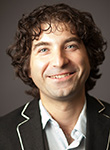Book on thought unites neuroscience and humanities
By Linda B. Glaser

With doctorates in philosophy and literature under his belt, Laurent Dubreuil has added a new field to his lexicon: cognitive science. After embarking on an intensive study of the subject, fueled by a Mellon Foundation New Directions Fellowship, Dubreuil has written a book about the distinction between thinking and thought. Based on his research in experimental psychology, literature and philosophy, he contends that there is a process in our minds that bypasses cognitive structure, which he calls “intellection.”
He begins “The Intellective Space” with the deceptively simple statement, “We say more than we think; we think more than we say.” For Dubreuil, professor of Romance studies and comparative literature and a member of the graduate field of cognitive science in the College of Arts and Sciences, the path to understanding the mind must combine the sciences with the humanities.
“The first paradigm of cognitive science was that you could look at cognition as a minimal process in the brain that makes you think – like computers compute,” he explains. “Language could be reduced to cognitive or syntactic structures and was considered only superficially different from what you were thinking, so there was little room to study language as an abstract movement in the mind. But many humanists would say that what you are saying is not the same as what you are thinking.”
Neuroscience experiments are not well suited to identify this intellection, says Dubreuil. Scientists are looking for the commonalities in the brain; by necessity they must discard the individual differences appearing in brain scans. There, cognition is conceived as a repeatable, executed task. But in situations where we do more than this – for instance, where we endow things with fluctuating meanings they don’t normally have – we can access what Dubreuil calls the “intellective space.”
If you tell someone to close the door, there isn’t much intellection beyond your cognition. But if you quote Sandburg’s poem, “An open door says, ‘Come in.’/A shut door says, ‘Who are you?’” your mind will process both the opening and shutting of doors – cognition – and also the meaning beyond.
According to Dubreuil, to reach the intellective space it is necessary to go through cognition. Math, for example, is a formalized language that strives to stay only within the cognitive space, without creating extra meaning. But while gifted mathematicians use the language of math to reduce “noise” and focus their thoughts, their minds create in a realm beyond cognition. Thus, says Dubreuil, exceptional phenomena both override and stem from ordinary rules. By looking at cognition we can find places where things are happening that can’t be explained completely through a cognitive framework.
Dubreuil makes a direct connection between the way neurons work in the human mind, the way language as a system works, and the way we think – which he says has lots of blind spots.
“While we can go beyond these blind spots, we can’t fill in the blanks. Knowledge is not continuous,” he says. “In any discipline you will at some point find a wall or a gap that prevents you from going further within the discipline. You can then go through another discipline, where eventually you will also find a wall. With truly interdisciplinary research, you end up with a mosaic. You see the image, but if you look closer the image is not continuous.”
Dubreuil’s current research focus is the intersection of cognitive science and poetry: how poetry is read and understood in the mind.
“I believe cognitive science will explain lots of things,” he says, “but what it can’t explain is something we should also address.”
Linda B. Glaser is a staff writer for the College of Arts and Sciences.
Media Contact
Get Cornell news delivered right to your inbox.
Subscribe